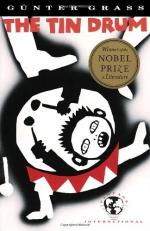|
|
The Tin Drum Chapter 6: The Schedule
Oskar says that Klepp often spends hours making schedules, including his eating of blood sausage and handing out illegal Communist propaganda. Klepp shows Oskar his schedule and it takes Oskar back to his first experience with a schedule.
It began in kindergarten. Hedwig Bronski would take Oskar and her son Stephan Bronski together to the same kindergarten, which was attended by six to ten other children. Their teacher, Auntie Kauer, would take them for walks through town. She would harness the children together with shafts of pale-blue knotted wool with bridles of wood with bells attached on the sides. Auntie Kauer would hold the reins and have the children trot along in front of her, singing prayers and hymns like "Jesus for thee we live, Jesus, for thee we die."
Oskar laments that he was forced to leave the kindergarten, on account of Stephan. In the spring when Oskar was seven, Auntie Kauer, in a fit of childlike exuberance, began to knit a new harness for the children, which was to be bright red. Just then, they heard cries - there was a boy on top of Stephan, punching him repeatedly in his already bleeding nose. He called Stephan a "Polack" as he hit him. Auntie Kauer broke up the fight as Oskar wound up the red yarn. It was then suggested that Stephan leave the kindergarten for good. Oskar refused to stay if Stephan was not there, even though he held no great liking for him.
Topic Tracking: Red & White 3
Topic Tracking: Red &White 4
Then it was time for Oskar to try school. Stephan Bronski was sent to Polish public school, Oskar to German school. On the first morning of school, Alfred tried to take away Oskar's drum. Oskar used his singing voice and shattered a vase. Alfred raised a hand to strike Oskar, but Agnes and Jan stopped him.
Oskar describes the school as a place where mothers were taking their children to offer them for sale. He says the granite water fountain troughs reminded him of his Uncle Vincent's piglets suckling at a sow. In Oskar's classroom, the mothers lined up along one wall and stayed for the first day of class. Both the children and the mothers laughed as Oskar came in with his drum - Oskar's mother Agnes felt ashamed of her son. Although completely calm, Oskar lamented only that he was not tall enough to see outside, for Greff was outside with his boy scouts.
Oskar's teacher came in and asked the class to sing a song with her. Oskar, disgusted that the singing children are so undisciplined, pulls out his drumsticks and begins to drum. His teacher nod at him in encouragement. Oskar says:
"The rabble behind me had long ceased their barbaric howls. I was beginning to fancy that my drum was teaching, educating my fellow pupils, making them into my pupils, when la Spollenhauer [Oskar's teacher] approached my desk. For a time she watched my hands and drumsticks, I wouldn't even say that her manner was inept; she smiled self-forgetfully and tried to clap her hands to my beat. For a moment she became a not unpleasant old maid, who had forgotten her prescribed occupational caricature and become human, that is, childlike, curious, complex, and immoral." Chapter 7, pg. 80
She then complemented Oskar but tried to take away his drum. Oskar gave her a warning scratch on her glasses with his voice. She let go of the drum but called him wicked. She changed her glasses and announced that she would give the students' their schedule of classes, and made them all repeat it after her. Oskar repeated the schedule by beating on his drum. The teacher found the drumming repulsive; she tried to take the drum again. This time Oskar sung out the classroom's windows. The teacher took out a cane and slammed Oskar's desk; he refused to have his hand hit, so she hit his drum with a violent glint in her eye. Oskar shattered the lenses of her glasses. The mothers threatened to pounce on Oskar's mother, but Oskar came to her aid and they left, pausing only long enough for a photograph by the school photographer.




